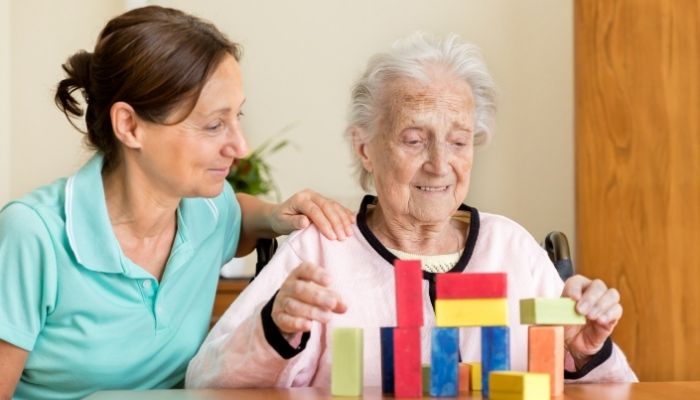Occupational Therapists assist older people who experience a range of conditions such as memory loss, vision loss, hearing loss, and poor balance/coordination to live independently at home.
Through a range of assessments, strategies and equipment, Occupational Therapists can vastly improve your wellbeing and help you participate in the meaningful activities of everyday life.
With Occupational Therapy, there are countless benefits for older people. In this article, we discuss 5 key benefits of Occupational Therapy at home.
1. Prevent falls
Slips, trips, and falls in and around the home are some of the most frequent causes of injury to older people. Falls are multi-factorial in nature, which means that the risk of falls is influenced by conditions within the person, within their environment, and as a result of the interaction between the two. The frequency of falls can usually be reduced or even eliminated with minor changes around the home.
Occupational Therapy involves working with you to review your home environment for hazards and evaluate you for any limitations that might contribute to falls. Services normally involve education, improving your physical abilities, modifying your home, and changing activity patterns and behaviours.
2. Improve mobility
Being able to get around is key to leading an independent and active life. Many older people rely on wheeled mobility devices such as wheelchairs and scooters to perform activities of daily living. A wheeled mobility device can improve your confidence to get out and about in your community again.
An Occupational Therapist provides mobility equipment that meets your specific needs for postural support, skin integrity, function, and safety. They also train you and your family members on the safe and efficient use of your device.
3. Restore independence
Making additions to the home with adaptive equipment can significantly improve your quality of life by allowing you to stay self-sufficient.
Tools such as dressing sticks, shoehorns and elastic shoelaces can make dressing tasks less challenging if you are experiencing limited range of motion or mobility. Similarly, handrails, shower chairs and raised toilet seats can ease the personal care process and decrease the risk of falls in the home.
There are many options for assistive equipment to help you maintain your safety. An Occupational Therapist works closely with you to determine the best equipment for your individual needs.
4. Enhance accessibility at home
Modifications to your home can help you to live safely and independently. After a thorough assessment, an Occupational Therapist suggests a range of home modifications to help make living at home easier.
Home modifications can be as simple grab rails, non-slip flooring, lever taps and step wedges. Modifications can also be more complex, such as installing access ramps, widening pathways, lowering countertops, modifying a bathroom, or installing automatic door openers.
5. Receive personalised support
Occupational Therapy understands that the needs of every person are different. A key benefit of receiving Occupational Therapy at home is that the support you receive is tailored to your individual needs and circumstances. Through a range of thorough assessments, your Occupational Therapist gets to know you beyond your care needs and ensures the support you receive is adapted. Additionally, the Occupational Therapist liaises with your broader healthcare team, including your GP and existing home care workers, to ensure a holistic care approach.
Receive Occupational Therapy at home today
Occupational therapy is very helpful as we become older, whether we have a chronic ailment that limits what we can accomplish or we need help living safely and independently in our own homes.
My Care Solution provides occupational therapy at home across Adelaide and Victor Harbor. Services can be paid for privately, through a Home Care Package or through the NDIS if you are self-managed or plan-managed.
If you require assistance, please contact us or book a free consultation with one of our skilled Client Care Coordinators.



